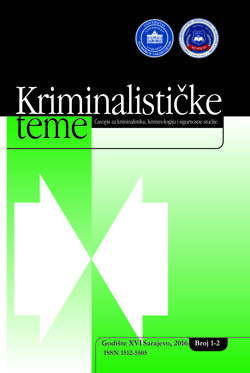ZNAČAJ KRIMINOLOGIJSKIH ISTRAŽIVANJA ZA SAVREMENU POLITIKU SUPROTSTAVLJANJA KRIMINALITETU
THE RELEVANCE OF CRIMINOLOGICAL RESEARCH FOR CONTEMPORARY CRIMINAL POLICY
Author(s): Darko DatzerSubject(s): Methodology and research technology, Criminology, Penal Policy
Published by: Fakultet za kriminalistiku, kriminologiju i sigurnosne studije Univerziteta u Sarajevu
Keywords: criminological research; public policy-making process; evidence-based practice;
Summary/Abstract: Reason(s) for writing and research problem(s): Criminology, widely considered as eminently empirical, desires to help decision- and policymaking to be based on facts and problem analysis, but it succeeds to do so on a modest scale. Although an intriguing matter, there are not many works, especially in BCS language, which discuss scope and manners of influence of criminological research on (criminal policy) decision-making processes and the causes of modest relevance of their results in everyday, practical decision-making process. Aims of the paper (scientific and/or social): The paper aims to describe and discuss manners by which criminology influences criminal policy decision-making processes. Furthermore, it seeks to explore grounds for modest relevance of such knowledge on practical decision-making process. Methodology/Design: The paper reviews typical manners of influence of criminological research on (criminal policy) decision-making processes. It does so by describing and discussing available literature, implying no special methods of data gathering. Review of literature implies the use of typical basic (analytic and synthetic) methods and general scientific methods. Research/paper limitations: The paper reviews relevant literature on a comprehensive scale. As any other review, it relies, however, on available literature and tends to describe, rather than to evaluate consulted works. Results/Findings: Literature review suggests that three typical ways of criminological research influence on policy making are instrumental, symbolic and conceptual, with the latter one most common. Typical reasons for low relevance of criminological research on decision- and policy-making process lies in its weak promotion, low credibility, researcher bias and limited research resources. General conclusion: Criminology and crime policy are complementary. Crime policy is without the information that criminology provides in danger to be regarded as unfounded. On the other hand, criminological knowledge without perspective to be practically utilized risks to be reduced to facts gathering endeavor and without real purpose. More needs to be done in promotion of criminological knowledge in crime-policy decision-making processes.
Journal: Kriminalističke teme – Časopis za kriminalistiku, kriminologiju i sigurnosne studije
- Issue Year: XVI/2016
- Issue No: 1-2
- Page Range: 15-31
- Page Count: 17
- Language: Bosnian, Croatian, Serbian

